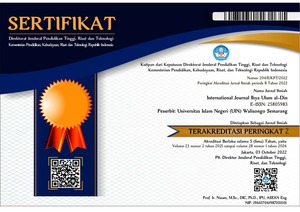Implementasi Maqashid Syariah dengan Pengembangan Ekonomi Hijau Melalui Urban Farming
DOI:
https://doi.org/10.21580/ihya.21.2.4834Keywords:
Green Economy, Maqashid Syariah, Urban farmingAbstract
The trend of conventional economic in emerging countries raises problems in other sectors with systematic. This results in inconsistencies with the main objectives of carrying out economic activities. Economic goals are not only oriented towards wealth, but also protect the living ecosystem (hifdzu-n-nafsi) and also protect offspring (hifdzu-n-nasli). Fundamental corrections are needed to find new ways of economic development. Green economy as a new way to solve economic problems applying Maqashid Shariah. Green economy through Maqashid Shariah focuses on 3 concepts: 1) the quality of economic growth, 2) environmental efficiency, and 3) social growth. As a paradigm that is able to maintain sustainable ecosystems in achieving social economic growth by supporting welfare improvement. Urban farming is becoming a new path of discovery to develop the prosperity of implementing a green economy in Indonesia. Urban farming is an industrial cycle that produces, processes and sells food and energy to meet the needs of city consumers. All activities are carried out by the method of using and reusing natural resources and urban waste. Besides fulfilling the basic needs of every family that is the basis of a measure of money, urban farming is needed to get money with other household needs. The idea of returning to nature shows that urban agriculture is able to meet economic quality growth targets, save energy and social interaction in accordance with Islamic economic principles.
Downloads
References
Abdul Aziz, A.F., and S Mohamad. 2013. “Fulfillment of Maqasid Al-Shariah via Takaful.” In MPRA Paper, 1–25.
Abdullah, S. 2012. “Risk Management via Takaful from a Perspective of Maqasid of Shariah.” Procedia-Socialand Behavioral Sciences 65: 535–41.
Akhtar, Muhammad Ramzan. 1996. “Toward Islamic Approach for Environmental Balance.” Islamic Economic Studies 3(2).
Al-Qardhawi, Yusuf. 2001. Ri’ayatu Al-Bi’ah Fi As-Syari’ah Al-Islamiyah. Cairo: Dar al-Syuruq.
Andreoni, V., and S Galmarini. 2016. “Mapping Socioeconomic Well-Being Across EU Regions.” International Journal of Social Economics 43(3): 226–43.
As-Syatibi. 1997. Al-Muwafaqat. Mesir: Daar Ibn ’Affan.
Averbeke, W. V. 2007. “Urban Farming in the Informal Settlements of Atteridgeville, Pretoria, South Africa.” AJOL African Journal Online: 338.
Bedoui, M. 2012. “Shari‘a-Based Ethical Performance Measurement Framework.” In The Chair of Ethics and Financial Norms in 2012,.
Butler, L, and D. M Moronek. 2002. Urban and Agriculture Communities: Opportunities for Ommon Ground, Ames. Iowa: Council for Agricultural Science and Technology.
Choudhury, M. A. 1999. “Global Megatrends and the Community.” World Futures 53(2): 229–52.
DESA. 2011. World Economic and Social Survey 2011 - The Great Green Technological Transformation. New York: UN Publications.
Fauzia, I. Y. 2016. “Urgensi Implementasi Green Economy Perspektif Pendekatan Dharuriyah Dalam Maqashid Al-Shariah.” Jurnal Ekonomi dan Bisnis Islam 2(1).
Janah, Nasitotul, and Abdul Ghofur. 2018. “Maqashid As-Ayariʻah Sebagai Dasar Pengembangan Ekonomi Islam.” International Journal Ihya’ ‘Ulum Al-Din 20(167).
Johnston, D. L. 2007. “Maqāsid Al-Sharī’a Epistemology and Hermeneutics of Muslim Theologies of Human Rights.” Die Welt Des Islams 47(2): 149–87.
Kasri, R. A., and H. Ahmed. 2015. “Assessing Socio-Economic Development Based on Maqāsid Al-Sharīʿah Principles: Normative Frameworks, Methods and Implementation in Indonesia.” Islamic Economic Studies 23(1): 73–100.
Kennet, M. 2008. “Green Economics - An Introduction to Progressive Economics.” Harvard College Economics Review 2(1).
Khallaf, A. W. 2003. Ilmu Ushul Fikih – Kaidah Hukum Islam. Jakarta: Pustaka Amani.
Mohammed, M. O., and D.A Razak. 2008. “The Performance Measures of Islamic Banking Based on the Maqasid Framework.” In IIUM International Accounting Conference (INTACIV),.
Muhajir, A. 2015. Islam Nusantara: Ijtihad Jenius & Ijma Ulama Indonesia Jilid 1. Jakarta: Pustaka Afid.
Negin, Vaghefi. 2017. “Building Malaysian Green Economy Model for Socio-Economic Development.” International Journal of the Malay World and Civilisation (Iman): 27–32.
Rafikov, I. and Saiti, B. 2017. “An Analysis of Fnancial Speculation: From the Maqasid Al-Shari’ah Perspective.” Humanomics 33(1).
Rahma, Ali, and Makhlani. 2013. “Pembangunan Ekonomi Dalam Tinjauan Maqashid Syari’ah.” Researchgate.net.
Regionomica. 2012. Green Economy, Presentasi, Workshop Regional Economic Development. Jakarta: GIZBappenas.
Sahroni, O., and A. A. Karim. 2015. Maqashid Bisnis Dan Keuangan Islam – Sintesis Fikih Dan Ekonomi. Jakarta: Rajagrafindo Persada.
Saumya. 2007. Green Economics, Presentation. Udai SJC.
Shihab, Q. 2003. Tafsir Al-Mishbah – Pesan, Kesan, dan Keserasian Al-Qur`an Volume 11. Jakarta: Lentera Hati.
Thomaier. 2014. “Farming in and on Urban Buildings: Present Practice and Specific Novelties of Zero-Acreage Farming (ZFarming).” Renewable Agriculture and Food Systems 30(1).
Umoh, G. S. 2006. “Resource Use Efficiency in Urban Farming: An Application of Stochastic Frontier Production Function.” International Journal of Agriculture & Biology 38.
UNEP. 2008. Reforming Energy Subsidies: Opportunities to Contribute to the Climate Change Agenda. Geneva: UNEP DTIE.
Downloads
Published
How to Cite
Issue
Section
License
By submitting an article to the journal, the author(s) agree to transfer the published article's copyright to the journal, which will act as the publisher. This means the journal will have the right to publish the article in various forms, including reprints. The journal will maintain the publishing rights to the published articles.
This work is licensed under Creative Commons Attribution-ShareAlike 4.0 International License.
In line with the license, authors and third parties (readers, researchers, and others) are allowed to share and adapt the material. In addition, the material must be given appropriate credit, provided with a link to the license, and indicated if changes were made. If authors remix, transform or build upon the material, authors must distribute their contributions under the same license as the original.



